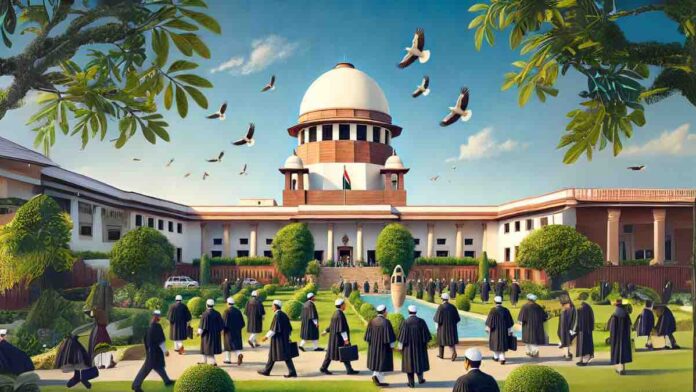In a landmark ruling aimed at strengthening environmental compliance, the Supreme Court on Friday restrained the Central Government from granting “ex-post facto” Environmental Clearances (EC) for mining and other development projects that began operations without securing prior environmental approval.
A Bench comprising Justice Abhay S. Oka and Justice Ujjal Bhuyan delivered the judgment while allowing a batch of petitions that had challenged the legality of government measures permitting retrospective environmental clearances.
Reading out the operative part of the verdict, Justice Oka said:
“There are no equities in favour of those who committed gross illegalities without obtaining prior ECs. The persons who acted without ECs were not illiterate persons. They are companies, real estate developers, public sector undertakings, mining industries etc. They were the persons who knowingly committed the illegalities. We therefore make it clear that hereafter the Central Government shall not come out with any version of the 2017 notification which provides for grant of ex-post facto EC. We have also set aside the 2021 OM.”
The court struck down the 2017 Notification and the 2021 Office Memorandum (OM), along with all circulars and orders issued under them. The Bench clarified that environmental clearances already granted under these instruments would not be affected by the ruling.
Background of the Case
The petitions, filed by environmental NGO Vanashakti and others, targeted the legal validity of the Standard Operating Procedures laid out in government memoranda issued in July 2021 and January 2022. These memoranda allowed projects that had commenced without obtaining Environmental Clearance — as mandated under the Environment Impact Assessment (EIA) Notification of 2006 — to be retrospectively regularised.
Vanashakti argued that the 2006 EIA Notification unequivocally mandates “prior” clearance, a term that appears 34 times in the text, underlining its compulsory nature. The NGO contended that any policy providing for ex-post facto approval was contrary to law.
Government’s Defence
The Ministry of Environment, Forest and Climate Change (MoEFCC) defended its position through an affidavit filed in July 2024 in a related case by NGO One Earth. The Union argued that the 2017 Notification had initially created a six-month window — which closed in September 2017 — to allow violators to seek clearance. The July 2021 OM, it stated, was a new mechanism to address violation cases that arose after the 2017 window closed.
The Centre maintained that completely denying such projects an opportunity to apply for clearance would lead to demolition and removal — actions which themselves might cause environmental harm. It cited the 2021 demolition of the Supertech Twin Towers as an example.
Additional Solicitor General Aishwarya Bhati, appearing for the Union, argued that the July 2021 OM did not override the need for prior EC but instead offered a regulatory solution for ongoing violations, consistent with the “polluter pays” principle under the Environment (Protection) Act, 1986.
Supreme Court’s Final Word
Rejecting these justifications, the Court observed that the entities responsible for starting projects without clearance were not ignorant or uninformed. It declared the policy of post-facto approvals as illegal and impermissible under environmental law.
With this ruling, the apex court has firmly reinforced the principle that environmental clearances must be obtained before project commencement, thus preventing future regulatory loopholes that could legitimize unlawful environmental degradation.




